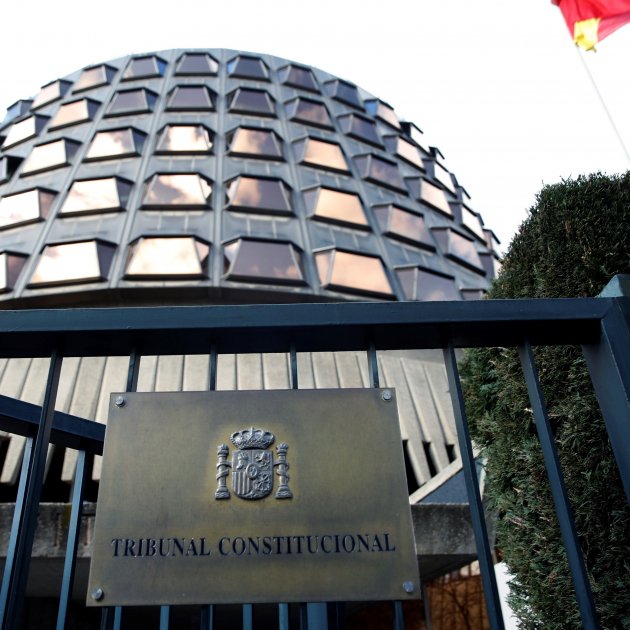The renewal of the Spanish constitutional organs is progressing. The most important piece of the puzzle, the General Council of the Judiciary (CGPJ), is still missing. But the Spanish coalition government and the opposition Popular Party (PP) have now broken the deadlock on the other institutions whose mandates were long-expired. After several days of very intense negotiations, the detailed make-up of the Constitutional Court, the Court of Accounts, the Ombudsman and the Spanish Data Protection Agency has been agreed on. The politicians point out that the names have been chosen by consensus and that they are "professionals of recognized prestige and with long professional careers". The Constitutional Court will retain its current conservative majority, but in the Court of Accounts a considerable purge has taken place, and in most of the institutions, some members with profiles close to Unidas Podemos have slipped in.
The 12-judge Constitutional Court, with the mandates of one third of its members expired, will see the entry of four new judges. This partial renewal will leave the majority where it was: in conservative hands. The new members will be the president of the criminal chamber of the National Audience, Concepción Espejel; the current Spanish parliamentary lawyer and former member of the CGPJ, Enrique Arnaldo Alcubilla; a judge of the High Court of Andalusia, Immaculate Montalbán, and a National Audience judge, Juan Ramon Sáez. Two are conservatives and two progressives, the same balance as for the judges who are leaving. Espejel and Arnaldo are considered close to the PP, while Montalbán is in the orbit of the Socialists (PSOE) and Sáez close to the circles of Podemos (formerly of Izquierda Unida). While Sáez voted to acquit Mossos police chief Josep Lluís Trapero, tried for sedition over the independence process, Espejel cast a minority vote in favour of convicting the Catalan police leader. The conservatives Juan José González Rivas and Andrés Ollero and the progressives Encarna Roca and Fernando Valdés leave the constitutional organ.
The Court of Accounts is almost completely renewed, with ten new members out of twelve. Only the progressive Dolores Genaro and Enriqueta Chicano continue. Genaro is precisely the member who gave a devastating minority opinion in the current case against the Catalan government officials over foreign policy spending. The majority of the supervisory body will become more favourable to the parties of the current Spanish coalition, who will hope that these changes might help to dilute the contentiousness of the independence issue. In fact, the member in charge of judging the Catalan foreign spending case, the former PP minister Margarita Mariscal de Ghent, will be relieved, as will the rest of the prosecution section. A new tribunal will have to be formed.
There will also be two Catalans in the new Court of Accounts: Joan Mauri Majós (administrative law professor at the University of Barcelona) and Llum Rodríguez (fiscal director of the Barcelona Provincial Council).
The other new members of the Court of Accounts are Isabel Fernández Torres (commercial law professor at the Universidad Complutense), Elena Hernáez Salguero (former president of the economic-administrative court of the Community of Madrid), Diego Íñiguez Hernández (judge of the contentious-administrative court) , Rebeca Laliga (deputy director general of notaries and registrars of the Spanish justice ministry), José Manuel Otero Lastres (commercial law professor), Javier Morillas (applied economics professor), Luis Antonio Ortiz de Mendivil Zorrilla (lawyer) and Miguel Ángel Torres Morato (chief prosecutor of the Court of Accounts).
As announced earlier on Thursday, the new Spanish Ombudsman (Defensor del Pueblo) is Ángel Gabilondo, who had been widely tipped for the job. In addition to being a metaphysics professor at the Autonomous University of Madrid, he was also a minister in the Zapatero government and a PSOE candidate in the last two elections in Madrid. Gabilondo's number two will be the PP deputy Teresa Jiménez Becerril.
Finally, the new director of the Spanish Data Protection Agency will be Belén Cardona, labour law professor at the University of Valencia. Her deputy will be Borja Adsuara, lawyer and consultant in digital law.
Ten days ago, the Spanish government and the PP agreed to break deadlock on the renewal of these four key organs, Constitutional Court, the Ombudsman, the Court of Auditors and the Data Protection Agency. The plan was to bring the matter to the Congress for approval next week, but it will probably be postponed for another week because no plenary session has been called for that week. There will be no problems in passing these finalised judicial lists, now that the governing parties and the PP leaderships are in agreement: for these appointments to prosper, a vote in favour by three-fifths of the Congress of Deputies is required, that is, 210 votes. The PSOE, Unidas Podemos and PP have 244 seats in total.
Now, the Moncloa government palace is pushing for the PP to reach agreement on the renewal of the CGPJ, the governing body of the judges. But this is the most delicate piece of the justice system's institutional structure. And the PP are resisting.
